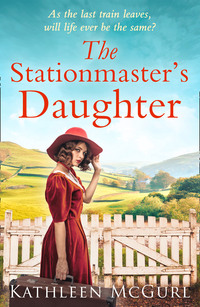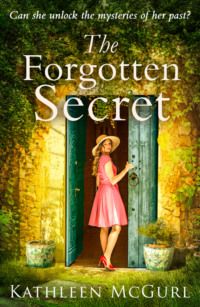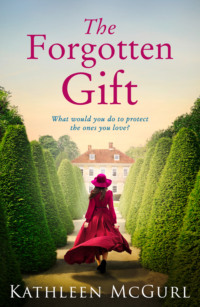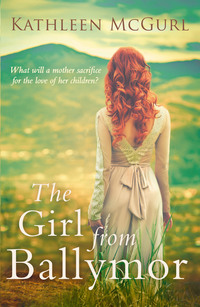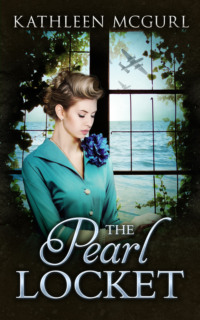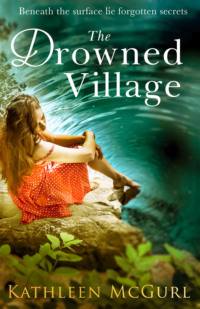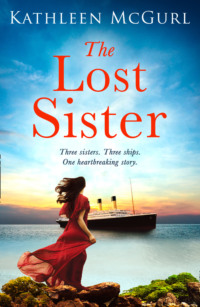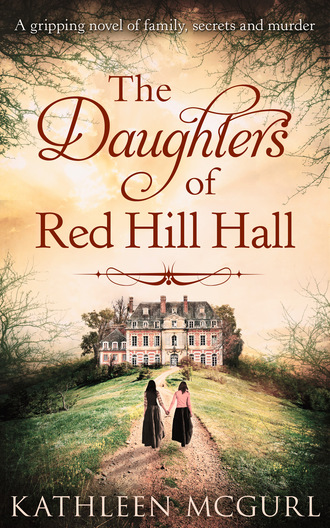
Полная версия
The Daughters Of Red Hill Hall

When Gemma discovers a pair of ancient duelling pistols encrusted with rubies in the basement of the local museum, she is immediately intrigued…
On a fateful night in 1838, two sisters were found shot in the cellars of Red Hill Hall. And when Gemma delves deeper into their history, she begins to realise that the secrets of that night are darker than anyone had ever imagined.
As the shocking events of the past begin to unravel, Gemma’s own life starts to fall apart. Loyalties are tested and suddenly it seems as if history is repeating itself, as Gemma learns that female friendships can be deadly…
Perfect for fans of The Emerald Comb, The Pearl Locket, Rachel Hore and Kate Morton.
The Daughters of Red Hill Hall
Kathleen McGurl

Copyright
HQ
An imprint of HarperCollinsPublishers Ltd.
1 London Bridge Street
London SE1 9GF
First published in Great Britain by HQ in 2016
Copyright © Kathleen McGurl 2016
Kathleen McGurl asserts the moral right to be identified as the author of this work.
A catalogue record for this book is available from the British Library.
This novel is entirely a work of fiction. The names, characters and incidents portrayed in it are the work of the author’s imagination. Any resemblance to actual persons, living or dead, events or localities is entirely coincidental.
All rights reserved under International and Pan-American Copyright Conventions. By payment of the required fees, you have been granted the non-exclusive, non-transferable right to access and read the text of this e-book on-screen. No part of this text may be reproduced, transmitted, downloaded, decompiled, reverse engineered, or stored in or introduced into any information storage and retrieval system, in any form or by any means, whether electronic or mechanical, now known or hereinafter invented, without the express written permission of HarperCollins.
E-book Edition © April 2016 ISBN: 9781474049627
Version date: 2019-11-18
KATHLEEN MCGURL lives near the sea in Bournemouth, UK, with her husband and elderly tabby cat. She has two sons who are now grown-up and have left home. She began her writing career creating short stories, and sold dozens to women’s magazines in the UK and Australia. Then she got side-tracked onto family history research – which led eventually to writing novels with genealogy themes. She has always been fascinated by the past, and the ways in which the past can influence the present, and enjoys exploring these links in her novels.
When not writing or working at her full-time job in IT, she likes to go out running. She also adores mountains and is never happier than when striding across the Lake District fells, following a route from a Wainwright guidebook.
You can find out more at her website: http://kathleenmcgurl.com/, or follow her on Twitter: @KathMcGurl.
Praise for Kathleen McGurl
‘There were twists and turns galore that had me gripping my Kindle to within an inch of its life…’
– Becca’s Books on The Pearl Locket
“…exciting, fast-paced and impossible to put down…”
– Books Reviews by Em on The Emerald Comb
“Two stories: one historical, the other contemporary, cleverly interwoven with conflict, mystery and passion…an absorbing read”
– Jane Hunt on The Emerald Comb
“Infuriatingly well-written…an intelligent and refreshingly different read”
– Read Reviewed on The Emerald Comb
“An edge of your seat read, that is a page turner and gripped me from page one”
– Comet Babe on The Emerald Comb
“…beautifully written and left you wanting more. More of everything.”
– Feed Me Into Books on The Emerald Comb
Also by Kathleen McGurl
The Emerald Comb
The Pearl Locket
The Girl from Ballymor
The Drowned Village
The Forgotten Secret
The Stationmaster’s Daughter
Acknowledgements
My thanks are due as always to my editor Victoria Oundjian and everyone else at Carina, for their advice, support, superb editing and wonderful cover designs.
Thanks also to my writing buddies – the other Carina authors, the Write Women and my friends in the Romantic Novelists Association. Writing is a lonely activity, and the online chats and occasional meet-ups are what keep me going.
My sons, once again, helped me out with this book. Fionn McGurl gave me valuable feedback as my beta-reader, and Connor McGurl acted as a sounding-board and helped me work out some tricky plot twists. My heartfelt thanks to both of them.
Thanks to Della Galton, whose writing classes I attended for many years. This novel grew from a prologue I wrote for one of her end-of-term competitions.
And finally, thanks to my husband Ignatius McGurl who was so enthusiastic about that prologue that it spurred me on to complete the entire novel.
For my husband Ignatius. This is the book you said I should write!
Contents
Cover
Blurb
Title Page
Copyright
Author Bio
Praise
Book List
Acknowledgements
Dedication
Prologue
Chapter 1
Chapter 2
Chapter 3
Chapter 4
Chapter 5
Chapter 6
Chapter 7
Chapter 8
Chapter 9
Chapter 10
Chapter 11
Chapter 12
Chapter 13
Chapter 14
Chapter 15
Chapter 16
Chapter 17
Chapter 18
Chapter 19
Chapter 20
Chapter 21
Chapter 22
Chapter 23
Chapter 24
Chapter 25
Chapter 26
Chapter 27
Chapter 28
Chapter 29
Chapter 30
Chapter 31
Excerpt
Endpages
Prologue
August 1838
The pain was unimaginable. Red-hot blades of it shot through Rebecca’s furiously throbbing shoulder, pumping blood across the cellar floor. She lay in agony, groaning, but managed a glance over to where Sarah lay, just a few feet away. The other girl was also bleeding profusely from a shot to her abdomen. The pair of pistols lay discarded on the floor where they had been dropped, their ruby-encrusted stocks glittering in the candlelight.
Rebecca felt strangely detached from the scene. She watched as blood from her shoulder flowed across the floor to meet with the pool that spread from Sarah’s skirts. Their life forces mingled and combined, indistinguishable from each other. It was fitting, she thought, that two women who’d been so close in life should be together as they died. For she was certain they would both die from their wounds. It was better that way. They couldn’t both live. Not after all that had happened between them, after all the hurt they had caused each other.
Sarah moaned in pain, and her eyes flickered open. Rebecca stared at her across the cellar and a wave of compassion flooded through her. She reached out a hand towards her one-time best friend and adopted sister, causing her pain level to escalate yet further. She watched as with a huge effort Sarah shifted her position and reached out too, until their fingers touched. One last heave and Rebecca was able to entwine her fingers with Sarah’s. She felt a weak squeeze in return, telling her the gesture was appreciated. Sarah groaned and sighed, and Rebecca watched as her adored sister’s eyes closed. Only then did she allow her own eyes to close as she slipped into blissful, pain-free darkness.
Spencer, the butler, had heard something. He’d been putting away the glassware used at dinner when he heard the explosion. It sounded like a shot, or rather two shots, coming almost simultaneously. He hurried along the servants’ corridor in search of the source of the noise, and spotted the door to the cellars standing open. It should have been locked shut – they kept a valuable store of wines down there. Spencer snatched up an oil lamp, rushed down the cellar steps and made his way through the labyrinth of rooms and tunnels that made up the cellars of Red Hill Hall. ‘Hello? Is anyone there?’ he called, his voice sounding shaky and nervous even to himself. Another door was standing open – the one that led to the coal store. From there a flight of steps led to the grounds of the hall. Someone could have come in – and then escaped – by that route.
At last, in an empty room beyond the wine cellar, Spencer found the source of the noise. He gasped as he angled the lamplight onto the two mounds on the floor and recognised them as Miss Rebecca and Miss Sarah. His adored Sarah – that wonderful, vivacious girl who could light up a room with her smile. Their fingers were linked together, as though they’d been holding hands when they were shot, perhaps trying to save each other.
‘Oh my word, girls, what has happened?’ he muttered as he approached. His foot kicked something, and looking round he saw one of the old master’s duelling pistols. The other one lay close by as well. He cursed himself for not keeping the pistols under lock and key. Someone had clearly got in, probably via the coal store, stolen them from where they were kept in a cupboard in the first cellar, and shot the two beautiful young ladies, whose whole lives had been ahead of them. But why had the girls been in the cellar? He shook his head. Now was not the time to ponder such things. He knelt down in the pool of still-warm blood and checked for signs of life. One of them had no pulse. There was nothing he could do for her. But the other was breathing and had a faint, if erratic, pulse. If he acted quickly, maybe, just maybe, she could be saved.
Chapter 1
April 2015
Not another fossil. Fossils were so darned boring. Gemma sighed as she pulled what must be at least the thirtieth ammonite today from the dusty box. She loved her job at Bridhampton’s little museum, cataloguing their extensive archive, but really, she had seen enough fossils to last her a lifetime. It was inevitable, she supposed, being so close to the Jurassic Coast in Dorset they were bound to have plenty of dinosaur bones and ancient marine creatures in the collection. But fossils did nothing for her. She preferred more recent history and human stories.
‘Cup of tea for my hard worker?’ Roger, the museum curator and her boss, put his balding head around the door.
Gemma nodded. ‘I’d love one, thanks.’ Poor Roger. He was practically another fossil. Well, that was unfair – he was probably only about ten years older than her – but he acted as though he was from the nineteenth century. Or before. She grinned to herself as she measured the ammonite and typed its details into the computer catalogue. He was old-school, that was for sure, but he was also the nicest boss she’d ever had. After leaving university with a history degree and no idea what she wanted to do with her life, she’d had a number of jobs in quick succession until two years ago she’d struck lucky here at the museum in her home town of Bridhampton.
By the time Roger returned with her tea, Gemma had finished cataloguing the contents of the box and was packing it up again to return it to its shelf in the museum basement.
Roger put the tea on the desk beside her, and moved some papers off a chair so he could sit down. ‘Anything interesting in that one?’
‘Half a dozen ammonites. One’s nearly a foot across. Weighs a ton.’ She closed the lid of the box and taped it up before Roger could start poking around in it. He did have a habit of wanting to pull things out and examine them, making the whole job take so much longer.
‘Oh well. Maybe we should use them in a Jurassic Coast display. What do you think?’
Gemma stopped herself from pulling a face. ‘We could, I suppose, but then the museum at Lyme Regis covers that so much better. Everyone goes there because of the Mary Anning connection. I think we should stick to other topics – human stories and Victorian themes.’ So much more interesting, she almost added.
‘You’re probably right.’ He smiled at her, and heaved the sealed box off the table. ‘I’ll fetch you the next one, then, to get started on once you’ve had your break.’
He looked quite sweet when he smiled, Gemma thought, as she watched him go through the door that led to the basement stairs. She resolved to be nicer to him in future. Poor bloke was probably lonely. He lived alone with only a cat called Michael for company. Who on earth calls their cat Michael, she thought, not for the first time.
Roger returned a few moments later bearing another cardboard box, this one festooned with cobwebs. He dumped it on the table and brushed the dust from his pullover. That was another thing. Who, these days, wore a hand-knitted jumper over a shirt and tie? Maybe she should have a gentle word with him about his fashion sense. If he ever wanted to get himself a girlfriend he’d need to first get himself a new wardrobe.
‘Here you are, then,’ he said. ‘Hope there’s something more exciting in that one. It was from aisle four, shelf three, if you want to make a note.’
‘Thanks.’ She jotted down the location code on her notepad, and slit open the tape across the top of the box, as Roger left her to return to the museum front desk. It was a Wednesday – their quietest day. Term time but no school parties booked, so they weren’t expecting many visitors beyond a few pensioners who were generally more interested in the tea and cakes they served in the museum café.
Tea finished, she pulled the next box towards her and opened it up. Inside was a crumpled-up piece of fabric – dark green cotton. She held it up – it was a shirt, smelling musty and dating from the 1970s if the collar was anything to go by. The label said St Michael. Great. A Marks and Spencer original, of no value whatsoever. Why on earth was it in this box? She threw it into her box of rubbish. It was amazing how much rubbish she had come across – usually screwed-up paper and sweet wrappers chucked into the boxes of artefacts. She looked in the box again. There was a layer of yellowed newspaper, which she pulled out and inspected. The Times, from January 1972. That tied in with the date of the shirt, then. It probably indicated the last time this box had been opened. She threw that into the discard pile as well.
Finally, at the bottom of the container, was a wooden box. It measured about two feet by one, and was four or five inches deep. It appeared to be made of mahogany, and was inset with an elaborate parquetry design. This looked more promising! She slipped on a pair of thin cotton gloves and lifted it out of the cardboard box. Clearing a space, she laid it on the table, and investigated its fastening. There was a brass hook and loop clasp, but thankfully no lock. She opened it up and gasped.
‘Wow. Just, wow.’ She looked around to see if Roger was in earshot, but he’d left the back rooms. Should she call him or wait and show him when he came back? He tended to pop into the back room every hour or so to see how she was getting on. She looked back at the contents of the box. No, this was too good to wait – he needed to see this now. She left the room and went through to the front of the museum to call him.
He came trotting after her. ‘I take it that box had something better than ammonites in it, then?’
‘Oh yes. Take a look.’ She indicated the box, and he gasped too.
‘Duelling pistols. And what an elaborate pair! Take one out – you’ve got gloves on.’
She carefully extracted one from its moulded place in the box. It was a beautiful item. ‘Gorgeous! Look at that silver work, and are those rubies on the handle?’
‘It’s called the stock, not the handle,’ Roger said. ‘Yes, I’d say mahogany trimmed with silver, and set with rubies. I’ll have to have a closer look with a magnifying glass to be certain of the materials. A very fine piece.’ He looked at the case. ‘And we have the pair, plus the ramrod, and that little flask there was probably used to hold the gunpowder.’
‘Yikes, hope there’s none in it now!’ Gemma squealed in mock horror.
Roger smiled indulgently and slipped on a pair of cotton gloves. He took the little flask out of the case and opened it. ‘Empty. We’re all right. I would guess those other slots in the case would have held the shot, probably lead. And maybe a cleaning brush. But how wonderful to have the pair, in such a lovely case! I think we’ll have to get these out on display.’
‘Do you think they were ever used in a duel?’ Gemma asked. It was a sobering thought – she might be holding a gun that had killed someone.
‘Who knows? They look very decorative. They could have been commissioned and bought just for show. Duelling pistols were often owned as a kind of status symbol. It’s unusual to have jewels in the stocks like this. And see the inside of the case’s lid?’
Gemma looked. It was beautifully painted with a scene showing two eighteenth-century gentlemen engaging in a duel, standing stiffly, their pistols pointed at each other, tricorn hats and flared coats giving a hint as to the era. To one side of the picture was a spreading oak tree, and two other men stood, holding the reins of black and bay horses. It certainly looked as though the case was designed to sit open, with the interior on display. Gemma found herself hoping that the pistols had never been used in anger.
‘Well, I’ll leave you to add that to the catalogue,’ Roger said, as he stood up and pulled off his gloves. ‘Don’t put them away afterwards though – leave them on my desk. I’d like to take a closer look after we’ve closed for the day.’
‘Sure, will do.’ Gemma grinned at Roger as he left, then turned her attention back to the case. She lifted out the other pistol and the ramrod, and started making notes about the case first. As she turned it over she noticed a yellowing label stuck to the base of it. There was writing on it, in a spidery hand: Bequeathed by Mrs A. Maitland, 1923. These pistols were the ones used in the infamous shooting at Red Hill Hall.
Gemma felt a shiver run down her spine as she read the words. An ‘infamous shooting’! – but not so infamous it was still remembered in 2015. Red Hill Hall – that rang a bell. She racked her brains trying to think where else she’d heard that place name recently. And then it came to her. Her boyfriend Ben’s sister Anna was getting married soon, and the invitations had arrived in the post a couple of days ago. The wedding and reception were to be held at Red Hill Hall. It was a country house hotel about five miles out of town.
Who’d been shot, when, and why? She had an overwhelming urge to research everything she could find about the shooting. If it was described as ‘infamous’ by whoever wrote the label on the bottom of the pistol case, then it must have been covered by newspapers of the time – whenever that was. She turned to the museum’s computer, opened up a Google search page and started typing ‘shooting at Red Hill Hall’. But before she could press the Enter key Roger came back.
‘Gemma, could you take over at the front desk, please? The café’s short of milk and I told Jean I’d pop up to the Co-op to get some. Won’t be long.’
‘Sure. Coming.’ She shut the laptop’s lid and left the back room, locking the door behind her so that no visitors would be tempted to wander in. The research would have to wait until later.
As it turned out, she did not get a chance to return to the back office that day. A coach party arrived and she was kept busy at the desk and in the small souvenir shop until closing time. All afternoon thoughts of the pistols ran through her head. Had someone been killed in this shooting? She supposed so – otherwise why would it have been described as infamous?
‘Roger, have you seen what’s on the underside of the pistols’ case?’ she asked, as they tidied the little museum shop after closing time.
He hadn’t, so she told him. His eyes lit up. ‘Well, I haven’t heard of this shooting but it certainly sounds like something worth investigating. Feel free to do it here; perhaps start searching online tomorrow?’
‘I was hoping you’d say that,’ she said, grinning at him. Something to look forward to at work tomorrow – infinitely better than measuring and describing endless ammonites for the catalogue!
‘You look lovely tonight,’ said Ben, kissing her as he stood to greet her in the Men At Arms pub, just a little way up the high street from the museum. It was her favourite pub – dark and cosy, old and full of character. ‘We’ve bought a bottle of Sauvignon. Nat chose it. Hope that’s all right for you?’
‘Fine, thanks. Hi, Nat,’ said Gemma. Actually she was more in the mood for a pint of bitter but as Natalie had got there first it seemed reasonable for her to choose the wine. Ben was so easy-going he’d drink anything. They were sitting at a table in a snug, its walls covered with dark wood panelling and hung with prints of Victorian country houses. She pulled an upholstered stool from under the table and sat down.
‘Cheers, then,’ said Nat, pouring her a glass and handing it over.
‘Cheers!’ Gemma clinked her glass against the other two and sighed happily. It was one of her favourite times of the week – being out for the night with her boyfriend and her best mate, the two people she loved best in the world. The three of them were inseparable, and had been ever since she and Ben had got together. Actually, she and Nat had been practically joined at the hip since school days.
‘Gemma, did you get Anna and Jake’s wedding invitation?’ Ben asked her.
‘I did. Can’t wait! It’s not till June though, is it?’
‘Nineteenth. I got one too. We’ll have to go shopping for new frocks,’ Nat said, with a wink at Gemma. ‘You’ll need something really smart. You can’t wear your usual tatty jeans and a fleece to a wedding, you know.’
‘Cheeky! Of course I’ll get something nice.’ Gemma gave Nat a playful punch on the arm. Anna, she hoped, would one day be her sister-in-law, if only Ben would get around to popping the question. And if he didn’t, well, next year was a leap year, so she’d do it herself. They’d been together seven years. It was time to make an honest man of him.
She suddenly remembered the wedding venue. ‘Hey, Ben, have you ever been to Red Hill Hall?’
‘Where?’ He looked blank.
‘Where Anna’s getting married, you dolt.’
He looked sheepish. ‘Oh yes, of course. No, never been there. Have you, Nat?’
‘No. It’s only just reopened under new management, hasn’t it? I think it was closed for years before then. I had a look at the website. Looks like a gorgeous setting for a wedding – all sweeping staircases and high-ceilinged ballrooms.’ Nat winked at Ben. ‘We’ll have fun there, won’t we – playing at lord and lady of the manor. Gemma, you could be my paid companion.’
‘Aw, why can’t I be the lady and you the companion?’ Gemma pouted.
Nat laughed. ‘You’ll need a very expensive dress if you want to upstage me, my dear. I intend buying something really fabulous. I’ll look amazing. Amazing, darling!’ She fluttered her eyelashes at Ben, who grinned and blew her a kiss, but caught hold of Gemma’s hand under the table and gave it a squeeze.


